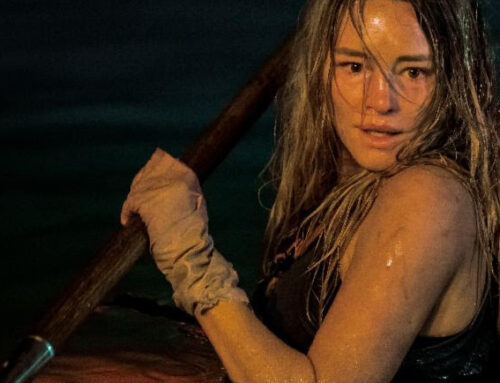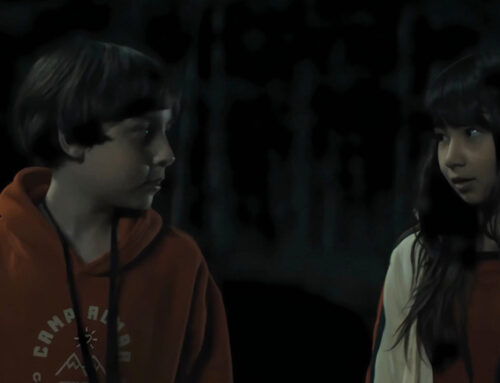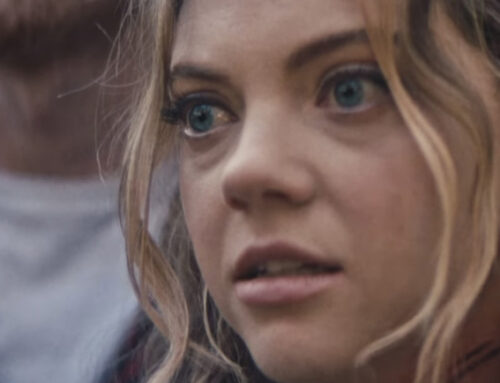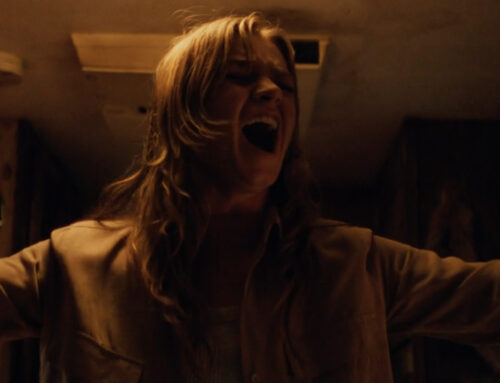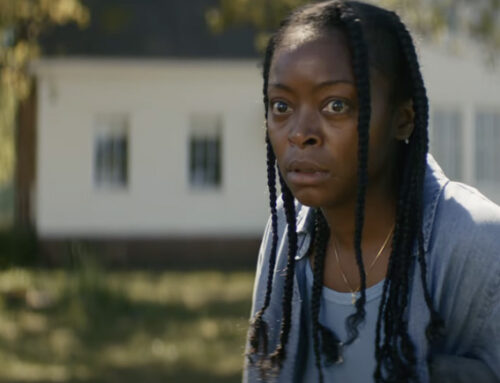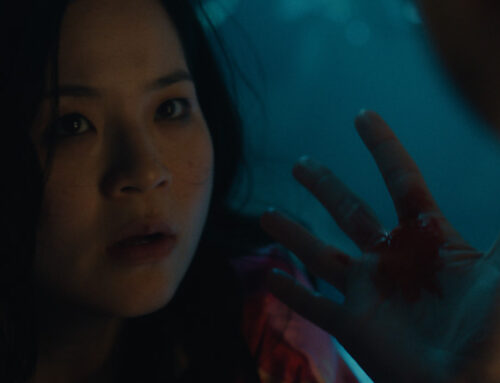Natalie Erika James made a name for herself with the stellar, slow-burn horror movie Relic from 2020. Her latest feature, Apartment 7A, is a prequel to Rosemary’s Baby. While crafting a prequel to Ira Levin’s novel and Roman Polanski’s influential adaptation would seem like an insurmountable task, James, and her co-writers, Christian White and Skylar James, do quite a good job.
While Apartment 7A has some familiar characters and callbacks to Rosemary’s Baby, it’s very much its own film, starring Julia Garner as Terry Gionoffrio, a Nebraska farm girl who moves to NYC, hoping to catch her big break. She’s lured by occult forces, and well, you can guess what happens next.
During Fantastic Fest, we chatted with the director and her co-writers about Apartment 7A and the importance of telling Terry’s story. The movie will stream exclusively on Paramount Plus beginning September 27.
This interview was edited slightly for clarity.
Creating a prequel to a novel and movie as influential as Rosemary’s Baby couldn’t have been easy. What made you want to tell Terry’s story all these years later?
Natalie Erika James: I was approached with a script, which set Terry’s story in 1960s Broadway. I was excited about not just the notion of playing in the world of the original mythology, but just to play with Terry’s journey and how much agency she had over her ambition. I was really interested in this focus on a really horrific event, an assault that she has to deal with, and the idea of a fractured self and coming back to herself in the context of trying to pursue a certain career. It felt like there were scenes that were relevant to women today.
Skylar James: We’re having the same conversations about a lot of issues that we’ve had for 50 years. Taking on something like Rosemary’s Baby is taking on sacred ground. You are filling some very, very big shoes. For me, there’s conversations to be had about foundational trauma, grooming, cults, and victimization. These are very real and prevalent issues.
Just in terms of continuing the conversation from Rosemary’s Baby in a grander sense, there’s something to be said about seeing the story through a different lens. For me that’s Terry Gionoffrio, this woman who has these ambitions and big dreams. She’s someone who’s not easily told no, sent home, or deterred. She’s a fighter from the first frame to the last frame of the movie. This continues on the conversation about women’s rights, body horror, political and social issues, but seeing them through this lens of this fierce woman who really does have something of her own to say.
Christian White: In the original, Rosemary is a victim. It’s a wonderful and beautiful film, but Rosemary is a victim. I never think of Terry as a victim. Bad things happen, but she’s also driving her own story. As she gets closer to her goal, she’s continually forced to shed more of herself and sacrifice more. There’s something about that agency and exploring a woman’s agency that was a reason to make this now.
Skylar James: Imagine the dumb luck of choosing a vessel for the devil’s seed who doesn’t even want a baby. [Laughs].
I was really surprised by the performances in this, not only Julia Garner’s as Terry, but also Jim Sturgess, who plays Alan Marchand and Dianne Wiest, who plays Minnie Castevet. They’re both so evil in different ways. We’re not used to seeing them take on roles like this. Natalie, can you talk about working with these two actors?
Natalie Erika James: Dianne has an incredible track record of playing larger-than-life characters but in a completely grounded way. I was immediately excited by the prospect of crafting Minnie with her. With Jim, you’re 100 percent right. You don’t seem him cast in a dark role. I think with both of them there was a real sense that you had to come at it from the character’s perspective. You have to buy into the characters. We spoke a lot about how it’s not necessarily religious, but it’s rooted in a belief in themselves. There’s a real sense of purpose. It’s not just evil for the sake of evil. I think it contextualized it for the characters in a way that’s believable. Building from there was the approach.

Dianne Wiest as Minnie Castavet in Apartment 7A, streaming on Paramount+ 2024. Photo Credit: Gareth Gatrell/Paramount+.
How much, if at all, did the Dobbs decision and the overturning of Roe v. Wade influence this film and its narrative? So much of the film is about a woman’s bodily autonomy. There’s even a scene where Terry attempts a back-alley abortion.
Skylar James: A lot. It’s a conversation that’s front and center in American politics right now. I think by showing a depiction of a woman in the 60s, who had no choice and the danger that put her in, I think that’s really important to talk about. No matter where you stand on the issue, it’s a conversation that’s important to have. We talk about it in the context of the devil’s spawn. [Laughs]. That element about women’s rights and a woman’s right to choose, that’s a universal and a timely conversation. It’s an important one to have. For me, it was at the forefront of the writing.
Christian White: It was something that was necessary to the story anyways. We had to go there. In a lot of the sensitive areas, we went through it and never skirted around it. The abortion issue was interesting. In Australia, it’s a sensitive topic as well, but nothing like it is in the United States. Culturally, it’s quite different.
I remember Nat and I doing a version of the story and having to remind ourselves that this is an American film. We had to think about all that baggage. We have a little bit of that baggage in Australia, but it’s more sensitive in the U.S. It’s so important to talk about it. As long as we’re talking about it, that’s good.
Natalie Erika James: Rosemary’s Baby is about bodily autonomy, and the fight for that and a real aggressive taking away of bodily autonomy for Rosemary, similar to Terry. It’s disturbing that it’s just as relevant today. I was moved by the research that I undertook to craft that [back-alley] abortion scene and how so many women were at unnecessary risk. Clearly, women had to resort to really extreme, dangerous means to have that control and bodily autonomy back in the 60s. To think we’re going back to that is harrowing.
After I watched this, I kept thinking about the relationship among the women in this film. Minnie essentially undercuts Terry and tries to groom her to do the occult’s bidding, while Annie (Marli Siu) is much more of an ally to Terry. Can you comment on the relationships among these women?
Skylar James: There was a real desire to show and depict strong women. That’s in the choice of having a female villain and a female hero. There’s that relationship with Annie and that close bond, as Terry decides what to do. She’s working through the trauma of a rape. She confides in her best friend. Then, you see tension in the dance company. Vera (Rosy McEwen) weaponizes these traumas against Terry. Showing the community of female relationships and how Terry navigates those, for me, was an empowering experience, specifically getting to show all these different types of female roles.
Christian White: There’s this cliché that you can’t choose your family. We all have those important relationships where we’re not related by blood. I think that’s what that central friendship was about. They’re sisters, bonded, because they live in the same world and have the same experiences. I was also surprised how strong the chemistry was between those two actresses. You felt that love. I really like their relationship.
Skylar James: Terry, at the end, says this is something that she has to face on her own. Giving her that strength and getting to see all sides of it was so important.
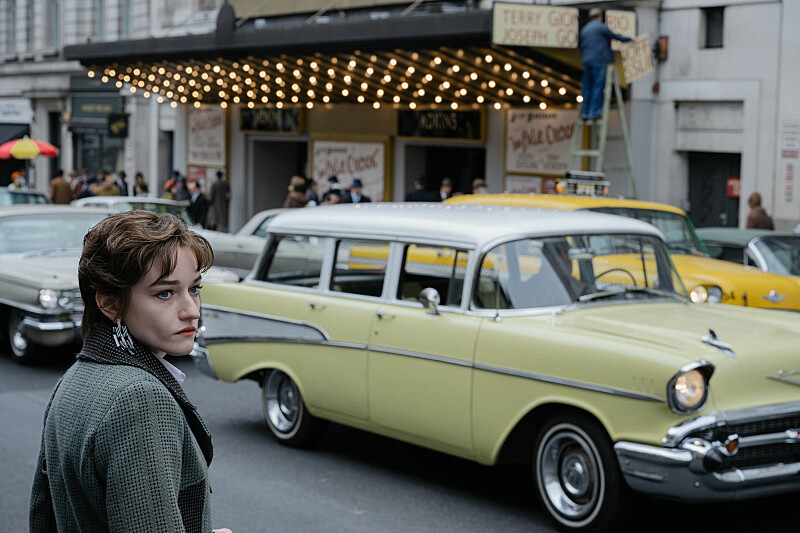
Julia Garner as Terry Gionoffrio in Apartment 7A, streaming on Paramount+ 2024. Photo Credit: Gareth Gatrell/Paramount+.
Natalie, what was it like to shoot some of the exterior shots at the Dakota in New York City, which was the location of the Bramford in Rosemary’s Baby, and can you comment generally on the production design?
Natalie Erika James: It was a really conscious choice to keep that continuity going into the film. We shot the film in London. It was just a skeleton crew that we sent to New York to actually shoot shots of the Dakota. It was definitely production design in collaboration with visual effects to achieve that. A lot of planning went into it. Simon Bowles, our production designer, did such an incredible job finding structures and streets that could match New York. Even the interiors and finding furniture to match the original film was impressive.
Apartment 7A will stream exclusively on Paramount Plus starting on September 27.

